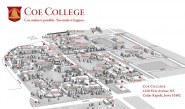Owner Biography
Coe College
According to the Coe College website "Coe College claims the shortest name of any American institution of higher education, but the school has actually carried five titles through its history.
When the Rev. Williston Jones founded the college in 1851, he called it The School for the Prophets. Cedar Rapids' first resident minister opened the parlor of his home to a group of young men with the goal of educating them for the ministry to serve churches in the Midwest.
Two years later, while Jones was canvassing churches in the East for money to send three of his students to Eastern seminaries, a Catskills farmer named Daniel Coe stepped forward with a pledge of $1,500 and urged Jones to start his own college in the frontier town of Cedar Rapids.
Legend has it that the $1,500 raised by Coe was brought from New York west, sewed into the petticoat of a lady visitor traveling by stagecoach to Iowa. Coe gave this generous gift with the stipulation that the proposed institute should be "made available for the education of females as well as males." Accordingly, Coe was coeducational from its founding.
With Jones' blessing, the Cedar Rapids Collegiate Institute was incorporated in 1853 by a group of Cedar Rapids leaders chaired by Judge George Greene. They used Daniel Coe's money to purchase two downtown lots for the school and 80 acres of farmland on what was then the edge of town. The farm would evolve into today's campus.
In 1868, the trustees renamed the school Parsons Seminary in a failed attempt to secure the Lewis Parsons estate. After a period of severe financial difficulties, the institution was reestablished in honor of its original benefactor as the Coe Collegiate Institute in 1875.
T.M Sinclair, founder of the Sinclair Meat Packing Company, played the key financial role in the final step toward the firm establishment of Coe College. Sinclair liquidated all the debt from Parsons Seminary and the Cedar Rapids Collegiate Institute. The Sinclair gift made it practical for the property of the Coe Collegiate Institute - including the original land paid for by Daniel Coe - to be transferred to Coe College with the Iowa Presbyterian Synod to assume major responsibility for the institution.
Coe College has operated continuously since its incorporation under that name on Feb. 2, 1881.
When the Rev. Williston Jones founded the college in 1851, he called it The School for the Prophets. Cedar Rapids' first resident minister opened the parlor of his home to a group of young men with the goal of educating them for the ministry to serve churches in the Midwest.
Two years later, while Jones was canvassing churches in the East for money to send three of his students to Eastern seminaries, a Catskills farmer named Daniel Coe stepped forward with a pledge of $1,500 and urged Jones to start his own college in the frontier town of Cedar Rapids.
Legend has it that the $1,500 raised by Coe was brought from New York west, sewed into the petticoat of a lady visitor traveling by stagecoach to Iowa. Coe gave this generous gift with the stipulation that the proposed institute should be "made available for the education of females as well as males." Accordingly, Coe was coeducational from its founding.
With Jones' blessing, the Cedar Rapids Collegiate Institute was incorporated in 1853 by a group of Cedar Rapids leaders chaired by Judge George Greene. They used Daniel Coe's money to purchase two downtown lots for the school and 80 acres of farmland on what was then the edge of town. The farm would evolve into today's campus.
In 1868, the trustees renamed the school Parsons Seminary in a failed attempt to secure the Lewis Parsons estate. After a period of severe financial difficulties, the institution was reestablished in honor of its original benefactor as the Coe Collegiate Institute in 1875.
T.M Sinclair, founder of the Sinclair Meat Packing Company, played the key financial role in the final step toward the firm establishment of Coe College. Sinclair liquidated all the debt from Parsons Seminary and the Cedar Rapids Collegiate Institute. The Sinclair gift made it practical for the property of the Coe Collegiate Institute - including the original land paid for by Daniel Coe - to be transferred to Coe College with the Iowa Presbyterian Synod to assume major responsibility for the institution.
Coe College has operated continuously since its incorporation under that name on Feb. 2, 1881.


